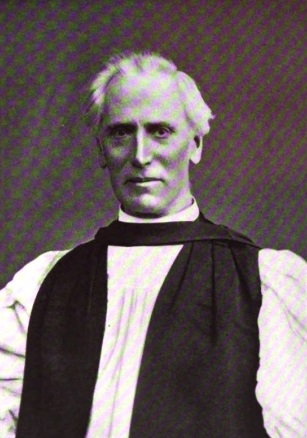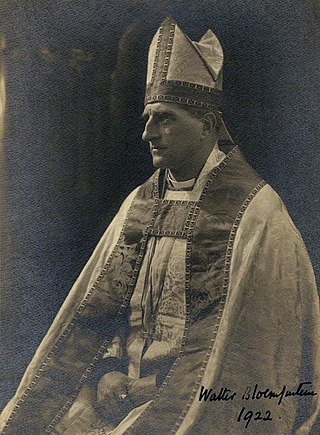Robin Roe was an Irish clergyman known for his work as an army chaplain, and a rugby union player.

John Percival was the first headmaster of Clifton College, where he made his reputation as a great educator. In his 17 years at Clifton numbers rose to 680. He accepted the presidency of Trinity College, Oxford, to recover from his years at Clifton. It was from Trinity that he went to Rugby to become headmaster of Rugby School before becoming Bishop of Hereford.
Thomas Crump was an English clergyman and amateur cricketer. After graduating from Oxford University, Crump held various ecclesiastical roles in the Herefordshire and Shropshire areas before moving to Somerset in 1880. He remained in Somerset until his death in 1907.

LLP

The Rt Revd Walter Julius Carey was an English Anglican clergyman and author who served as Bishop of Bloemfontein in South Africa from 1921 to 1935. Carey was a rugby union forward who played club rugby for Oxford University and Blackheath and played international rugby for the British Isles XV in their 1896 tour of South Africa.

Paul Robert Clauss was a German-born rugby union three-quarter who played club rugby for Oxford and Birkenhead Park. Clauss was a member of the first official British Isles tour in 1891 and also represented Scotland on six occasions. He was part of two Triple Crown winning teams for Scotland, and made an impressive international start in the 1891 Championship, scoring in all three Scotland games.
Piercy Henderson "Dolly" Morrison was an English rugby union three-quarter who played club rugby for Northern and Cambridge University and played international rugby for England.

Alexander Findlater Todd was an English rugby union forward who played for Cambridge University and Blackheath F.C. at club level, and Kent at county level. Todd played international rugby for England and later represented the British Isles team on their 1896 tour of South Africa.

William Ralph Martin-Leake was an English rugby union forward who played club rugby for Cambridge University and Harlequins and international rugby for England. In 1890 Leake became one of the original members of the Barbarians.
Charles Alexander Hooper was an English rugby union forward who played club rugby for Cambridge University and Middlesex Wanderers and international rugby for England. In 1890 Hooper became one of the original members of the Barbarians Football Club.
William Ernest Bromet was an English rugby union forward who played club rugby for Oxford University and Tadcaster and county rugby for Yorkshire. Bromet and was a member of the first official British Isles tour in 1891 and represented England on twelve occasions between 1891 and 1896. Bromet was a part of the 1892 Triple Crown winning team for England.
William Martin Scott was an English international rugby union half back who played club rugby for Cambridge University and Northern. Scott played international rugby for England and was an original member of invitational team, the Barbarians. He also played first-class cricket for Cambridge University.
Percival Coles was an English sportsman and sporting administrator. Although Coles did not play any sport at an international level, in rugby union he was one of the founding members of the Barbarians Football Club and later became Secretary of the Rugby Football Union. As a cricketer he played for Oxford University and Sussex.
Eustace Herbert Guest North was an English international rugby union forward who played club rugby for Oxford University and Blackheath. North played international rugby for England and was an original member of invitational team, the Barbarians.
William Thomas Charles Cave was an English international rugby union forward who played club rugby for Cambridge and Blackheath. Cave played international rugby for both the British Isles and England, and was also selected for invitational team the Barbarians.
Lt. Colonel Gilbert Faraday Collett DSO was an English sportsman who was an international rugby union wing and first-class cricketer for Gloucestershire County Cricket Club. As a rugby footballer he represented Cambridge University and Cheltenham at club level. Collett also played international rugby for the British Isles during the 1903 tour of South Africa but was never selected for the England national team.

Percy Christopherson was an English sportsman who played rugby union as a threequarter for Blackheath and represented England at international level. Christopherson also played cricket, making two first-class appearances. He was employed as a teacher at Wellington College, Berkshire.
Albert Ernest Elliott was an English rugby union player who played club rugby for Cambridge University and St. Thomas' Hospital. Elliott gained his only international cap when he was selected for England in 1894. He is also notable for being one of the few international rugby players to die serving during the Boer War.
William Eldon Tucker was a Bermudian rugby union player who played club rugby for Cambridge University, St. George's Hospital and Blackheath. Tucker gained his first of five international caps when he was selected for England in 1894. He returned to Bermuda after qualifying as a medical doctor.
John Roberts was a Welsh international forward who played club rugby for Cambridge University, London Welsh RFC and Cardiff RFC. He won 13 caps for Wales and was also selected to play for invitational touring club the Barbarians.







